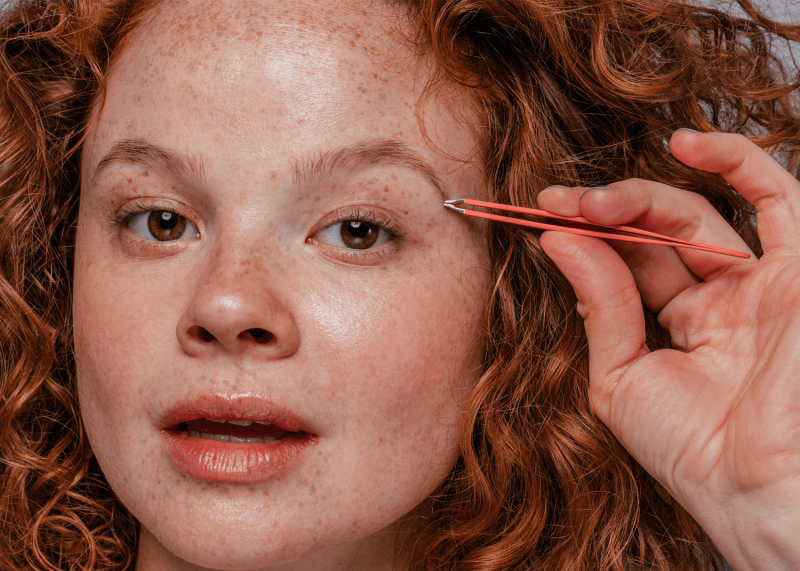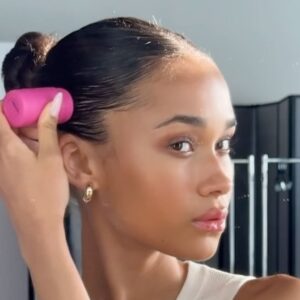
Whether you’re looking to add some shape and definition to your brows or clean up your bikini line, sometimes you feel like it’s time to get rid of some hair. But what’s a better way to do so: plucking or waxing? And how do you choose between the two?
First things first—it's helpful to understand that ultimately, there are pros and cons to both techniques, and the choice is highly individual. "Whether one is better than the other will depend on individual preferences and specific circumstances," says Jenneane Rocha, esthetician and owner of Jenneane's Skincare. "You might find that you prefer a combination of both plucking and waxing."
Looking for a bit more information to guide your decision? Below, find out what you need to know about plucking and waxing, and some key factors experts urge you to consider.
Plucking Hair
Plucking is a precise, affordable, and convenient way to remove hair. “If done correctly, tweezing is great for achieving a soft, fuller look for your brows,” Rocha says. “It’s also suitable for individuals using active ingredients in their skincare routine, those with sensitive skin, or anyone taking medications that thin the skin.”
Pros
- Ability to target specific hairs: If you’re only trying to get rid of a few stray hairs, tweezing is the perfect opportunity to be super precise.
- Easy to do yourself: Using a pair of tweezers to remove a hair or two is generally considered much easier than attempting to use wax on your own. “You can [pluck hair] from the comfort of your home,” says Maureen Gaspard, the director of esthetics at Seaside Skin Care. “Plus, a pair of good tweezers will cost less than a single waxing appointment.”
- Less risk for irritation: While waxing is known to have some immediate side effects including redness and inflammation, plucking is more gentle on the skin. “There is no risk of irritation, skin lifting, or a reaction with plucking,” adds Gaspard.
Cons
- Time-consuming: Plucking individual hairs can be a tedious task.
- Painful: Each hair you pluck may not be all that painful, but the process can take a while and you may start to feel a bit over the whole ordeal.
- Broken hair follicles: If you pluck your hair incorrectly, you might break hairs, which can cause them to grow back sooner or contribute to ingrown hairs, Rocha says. "Tweezing too aggressively beyond the natural shape can damage hair follicles, which may inhibit hair growth."
- Tricky to successfully remove hair: "As an esthetician, I often see skin abrasions or small skin ulcerations where a client is trying to tweeze a hair that is too short or very stubborn," Gaspard says. "Sometimes, that attempt is unsuccessful and then they have blemished skin left behind."
- Risk of infection: Tweezers can increase your risk of infection if they haven't been properly sanitized. Gaspard recommends wiping down your tweezers with 90% isopropyl alcohol before each use.
Waxing Hair
“Waxing offers precision in shaping and provides a cleaner look by removing fine hairs that tweezing might miss,” Rocha says. This process consists of hot wax being placed on the skin and then torn off once it has cooled down. There are several types of wax such as hard wax, soft, wax, waxing strips and more.
Pros
- Precise results: With professional waxing, you can achieve brows with sharp edges and a well-defined shape. “Another area for precision is the pubic area. Whether you prefer a triangle, strip, full Brazilian, or other design, a professional wax can get you there,” Gaspard says. “It would be near impossible to achieve this outcome with plucking.”
- Lasts longer: “The results last anywhere from 3 to 6 weeks, leaving the skin soft and smooth as it removes hair from the root and also removes dead skin cells,” Garpard tells us.
- Efficient to treat large areas of hair: Wax can be applied to any sized area. Whether you are targeting your entire back, legs, or just your eyebrows, large strips of wax are the quickest way to remove large areas of hair.
Cons
- The process can be painful: You might experience pain, skin reactions (especially if you have sensitive skin or take certain medications), or ingrown hairs.
- Visible redness or irritation: Your skin might also lift in a way that resembles a burn, Rocha says.
- Higher room for error: “It is imperative that you go to a waxing specialist to ensure that your results are worth the expense,” Gaspard says. “They can advise you on post-care that will minimize the potential drawbacks from waxing.”
Considerations
As you weigh the benefits and drawbacks of waxing versus plucking, you’ll want to keep a few different factors in mind. For example, your pain tolerance, where you’re at in your menstrual cycle, medications and ingredient intakes, and more. Below experts break down several important factors to consider.
Treatment Area
First, ask yourself what part of your body you want to remove hair. This will be an easy indicator of what technique will serve the best results. "Plucking is best for small areas and single, stray hairs while waxing is best for larger areas in which multiple hairs need to be removed," Gaspard says.
Medications
Some medications have ingredients that can make your skin more sensitive, so you’ll want to keep this in mind. If you’re plucking or tweezing, you typically don’t need to worry about any adverse reactions related to medication. But if you’re taking medications like retinoids, blood thinners, chemotherapy, or some antibiotics, you should avoid waxing, Gaspard says. “Tweezing is generally safer in such cases to prevent irritation or adverse reactions,” adds Rocha.
Menstrual Cycle
You can pluck and wax at any point during your menstrual cycle, but both may be less painful outside of your peak menstruation days. This is because "during menstruation, heightened levels of prostaglandins can make the skin more sensitive and prone to discomfort during waxing," Rocha explains.
Skin Sensitivity
Do you have sensitive, reactive skin? If so, tweezing may be the better choice for you. "If you have sensitive skin or are using medications that thin the skin, opting for tweezing can help avoid potential reactions," Rocha says.
Hair Type
We have different types of hair on different parts of our body. You might have fine hair on your eyebrows and coarse hair on your bikini line. This is an important factor to note when looking at your treatment options. “Plucking is suitable for coarse, single hairs, while waxing works well for both fine and coarse hair,” Gaspard says.
Pain Tolerance
Pain can present in a few different ways. Gaspard explains that with plucking, pain is localized but more frequent. With waxing, the pain can be really intense, but the process is over with quickly.
Maintenance
"Plucking requires more frequent maintenance since hairs grow back individually, as opposed to longer lasting results with waxing, but it does require a longer growth period before the next waxing session," Gaspard says.
Caffeine Intake
Do you normally grab coffee on the way to your waxing appointment? You may want to swap your schedule around a bit. Turns out that being highly caffeinated right before waxing or plucking can have some negative side effects.
"It's advisable to avoid caffeine before waxing or tweezing as it can increase blood flow and make the skin slightly more sensitive," Rocha says. "This can potentially lead to increased bruising or discomfort."
The Final Takeaway
Plucking and waxing are both effective ways to remove hair. Generally, plucking is better for removing small amounts of hair. If you're looking to remove large areas of dense hair, waxing might be the better choice. That said, many other factors play into the mix, like if your skin is sensitive, you're taking certain medications, or you are using skincare products that might make your skin more reactive. If you're still unsure whether waxing or plucking is a better choice for you, take some time to chat with your dermatologist or an esthetician about your concerns.
